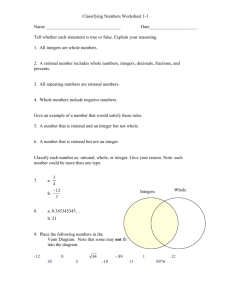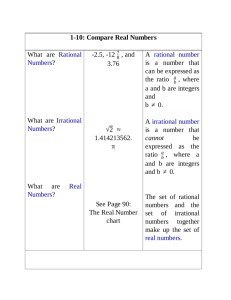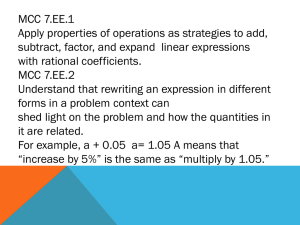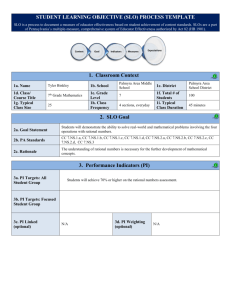Research on Rational Number, Ratio, and Proportionality
advertisement
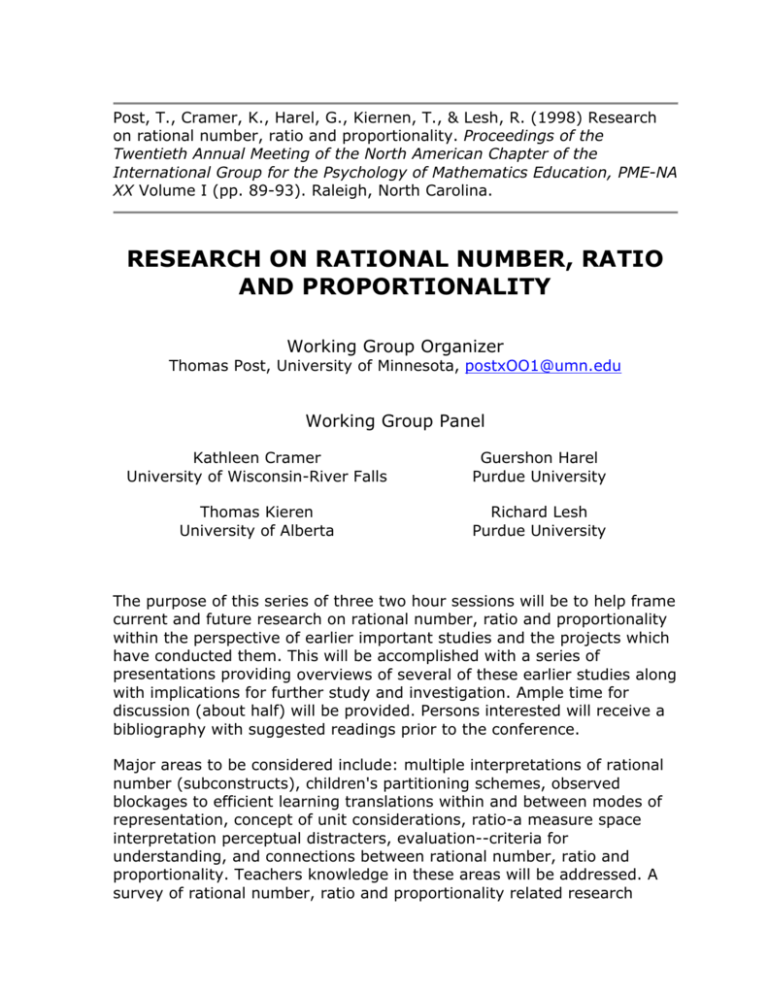
Post, T., Cramer, K., Harel, G., Kiernen, T., & Lesh, R. (1998) Research on rational number, ratio and proportionality. Proceedings of the Twentieth Annual Meeting of the North American Chapter of the International Group for the Psychology of Mathematics Education, PME-NA XX Volume I (pp. 89-93). Raleigh, North Carolina. RESEARCH ON RATIONAL NUMBER, RATIO AND PROPORTIONALITY Working Group Organizer Thomas Post, University of Minnesota, postxOO1@umn.edu Working Group Panel Kathleen Cramer University of Wisconsin-River Falls Guershon Harel Purdue University Thomas Kieren University of Alberta Richard Lesh Purdue University The purpose of this series of three two hour sessions will be to help frame current and future research on rational number, ratio and proportionality within the perspective of earlier important studies and the projects which have conducted them. This will be accomplished with a series of presentations providing overviews of several of these earlier studies along with implications for further study and investigation. Ample time for discussion (about half) will be provided. Persons interested will receive a bibliography with suggested readings prior to the conference. Major areas to be considered include: multiple interpretations of rational number (subconstructs), children's partitioning schemes, observed blockages to efficient learning translations within and between modes of representation, concept of unit considerations, ratio-a measure space interpretation perceptual distracters, evaluation--criteria for understanding, and connections between rational number, ratio and proportionality. Teachers knowledge in these areas will be addressed. A survey of rational number, ratio and proportionality related research reported in past PME proceedings will be discussed. Guidelines for the construction of theory based instructional student/teacher materials will be considered. Time will also be devoted to understanding innovative research designs for research on rational number constructs. Importantly, implications for our future work in these domains will also be explored relying on participant discussion and contributions from the floor. We have lived through a series of "content free" programs which have captured the attention of teachers and school administrators nationwide. As a result, teachers have not spent the needed time to learn about actual mathematical content and students struggles to learn it. An elementary school administrator recently (and proudly) had boasted that every elementary teacher in her district (over 1000) had 30 hours of Madeline Hunter. There is nothing wrong with Hunter's ideas, and the intent here is not to demean those ideas but unless they are applied to meaningful mathematical (or other) content there is no a-priori reason to expect students achievement levels to prosper. That time would have been better spent applying Hunter's ideas to children's learning of rational number concepts or some other topical domain. Similar things have happened with cooperative learning and radical constructivism. All sound ideas, but useful only to the extent they are applied to high quality (useful and theoretically sound) mathematical and pedagogical content. It is this latter category of concern which has proven to be elusive to many teachers and administrators in school situations who are attempting to improve the school mathematical experience for children. Site based management where individual school based teachers and administrators make all curricular decisions does not help the situation either. This session will attempt to reassert the importance of accumulating knowledge about teachers and students learning of rational number, ratio, and proportionality. We will do this by examining the work of several projects, groups and individuals who have made important contributions to the field. We will then use these "classical" studies as a springboard to identify additional investigations to further our knowledge and understandings in these areas. The Rational Number Project (RNP) is a program of cooperative research which has been funded continuously by the National Science Foundation (NSF) since 1979. It is thought to be the longest lasting cooperative research project in the history of mathematics education. To date, there have been six separate multi-year NSF grants involving the Universities of Minnesota, Wisconsin at River Falls, Northern Illinois, Louisiana State, Northwestern, Massachusetts at Dartmouth and Purdue. The project bibliography contains eighty or so entries including books, research reports, book chapters and technical reports. There also have been a like number of presentations at regional, national and international meetings. The RNP bibliography will be shared with participants at one of our sessions. The RNP is generally considered to have made important contributions to our understanding of children's rational number thinking. The first of the RNP grants was obtained in 1979 to examine the impact of manipulative materials on children's understanding of rational number concepts. Later grants have extended our study of fractions to the study of proportionality in the middle grades. We are now working with middle grade teachers in a teacher enhancement program to facilitate the implementation of new NSF middle school curricula, including the RNP fraction lessons. This latest grant (1994-98) is primarily concerned with the development and testing of a model for re-educating middle grades teachers. The model used attempts to integrate teachers mathematical, pedagogical and psychological content knowledge. (a la Shulman). Behr, Cramer, Harel, Lesh and Post have been the mainstays of the RNP over the years although others have worked with us for shorter periods of time. (Bright, Khoury, Silver and Wachsmuth and many, many graduate students through the years). In addition, RNP project personnel have worked with many of our colleagues in mathematics and in psychology on issues of mutual interest. 1) Tom Kieren has been interested in the domain of rational number throughout much of his career at the University of Alberta. His work on partitioning with Pothier have contributed important understandings into the partitioning related behavior of young children. Tom is fond of saying that mathematics is "about something'' "About something" is an important idea which has been lost on many who have over the years driven students to premature abstraction and to a preoccupation with computational algorithms. Tom has provided an important conceptual framework for the RNP with his paper "On the mathematical cognitive and instructional foundations of rational numbers" (1976) in which he suggests important components of rational number understanding and his belief that a mathematically literate person in the rational number domain has an integrated view as to how the various subconstructs part-whole, ratio, decimal, indicated division, measure and operator interact and are related to one another. He argues for a research program which acknowledges the interrelated nature of these subconstructs. Tom will comment on his current views of these subconstructs and related rational number issues. 2) Vergnaud (1983, 1988) coined the term "Multiplicative Conceptual Field" (MCF) to refer to a web of multiplicatively related concepts, such as multiplication, division, fractions, ratio and proportions, linearity, and multilinearity. Similar to Kieren's' subconstructs of rational number, a key idea of the MCF is the observation that its content is not a mere collection of isolated concepts but rather an interconnected and interdependent complex structure. Its complexity is both mathematical and developmental. Until the mid 80s, research in mathematics education looked, to a large extent, at the development of individual multiplicative concepts, without explicit attempts to deal with the interrelations and interdependencies within, between, and among these concepts. For example, research on the rational number concept did not take into account children's conceptions of multiplication and division, and vice versa. Similarly, research on the learning of the decimal system was quiet separate from research on fractions and proportionality. During the middle-to late 80s, the RNP advanced the research on the MCF by exploring the interconnectivity of the cognitive development of multiplicative concepts. As an example, we mention one important result of this research: In a study with inservice elementary school teachers, we found that teachers use four solution strategies to multiplicative problems that do not conform to Fishbein's intuitive models: (a) The Multiplicative strategy, involving the concept of proportionality. (b) The Pre-multiplicative strategy, reflecting an early stage toward proportionality. (c) The Operation- search strategy, based on a trial-and-error approach. (d) The Keyword strategy. We found that teachers who solved the problems correctly and relationally reasoned in terms of ratio and proportion concepts, whereas teachers who arrived at correct solutions without these concepts did so by a trial-and error like methods. This suggests that multiplicative problems that do not conform to Fishbein's models require for their solution a scheme that includes the concepts of ratio and proportion. This finding suggests that the formation of ratio and proportion concepts can be powerful tools in dealing with multiplicative problems. The question of whether these concepts are necessary tools for multiplicative problems that do not conform to Fishbein's intuitive models is still open and needs further research. Within the enormous structure of the MCF, we have identified smaller structures that, although interconnected, are, to some extent, autonomous. An example of such a substructure consists of a three-stage development of the concept of multiplication: from an early stage of whole number multiplication, to an operation non-conservation stage, and to an operation conservation stage. We have called this structure, a Multiplicative Conceptual Subfield (MCS) because it represents a closed unit within the greater structure of the MCF. Our semantic analyses of the different MCS's-drawing heavily on the work of many other researchers, particularly, the work by Kieren, Steffe, Thompson, and Kaput-revealed critical deficiencies in the mathematics curricula of elementary and middle schools. The areas where the teaching of [MCS's] is deficient include composition, decomposition, and conversion of units, operation on numbers from the perspective of mathematics of quantity, and mathematical variability. Guershon Harel will discuss the implications of these issues for school rational number curricula and for further research in the area. 3) Innovative Research Designs Needed for Research on Rational Numbers Constructs New research designs have been developed are based on new assumptions about the nature of students' knowledge, problem- solving, learning and teaching, they frequently involve lines of reasoning that are fundamentally different from those that applied to industrial-era factory metaphors for teaching and learning. Therefore, new standards of quality often are needed to assess the significance, credibility, and range of usefulness of the results that are produced by such studies. But, in general, the development of widely recognized standards for research has not kept pace with the development of new problems, new theoretical perspectives, and new approaches to the collection, analysis, and interpretation of data. High-quality studies may be rejected because they involve unfamiliar research designs, and because inadequate space is available for explanation, or because inappropriate or obsolete standards of assessment are used (similar to a Type I error). Low quality studies may be accepted in which innovative research designs are done poorly, or in which traditional research designs even though they are based on obsolete assumptions about the nature of teaching, learning and problem-solving (or about the nature of program development, dissemination, and implementation) (similar to a Type Il error). In research on rational numbers and proportional reasoning, as in other areas of mathematics education research, some of the most important products of research has involved the development of new tools and research methodologies. Yet, these products seldom are reported in research journals. In a series of projects known collectively as the Rational Number Project, some of the most useful research designs that we've developed involve the integrated use of qualitative and quantitative methods. Also, because we often are interested in going go beyond investigating typical development in natural environments to also focus on induced development within carefully controlled and mathematically enriched environments, we have had to develop new approaches to research that involve: 1) Action research: in which teachers participate as coresearchers. 2) Multi-tiered teaching experiments: investigating the interacting development of students and teachers often over time periods involving several months or years. 3) Carefully structured clinical interviews: in which it is important to minimize uninteresting interventions by the researcher. 4) Iterative videotape analyses: in which it is important to take into account interpretations involving a variety of theoretical and practical perspectives. 5) Ethnographic observations: in which it is important to avoid needlessly distorting the perspectives of the people being observed. 6) New approaches to assessment: that focus on deeper and higher order understandings, and which go beyond simplistic assumptions that underlie most standardized testing programs. Dick Lesh will lead a session which will deal with each of the preceding approaches to research. Examples will be taken from relevant research on rational numbers and proportional reasoning, and resources will include selections from a new book, edited by Kelly & Lesh (in press), on Research Design in Mathematics and Science Education. References To be distributed at or prior to the PME-NA Meeting.



